#GDPR Compliance
Text
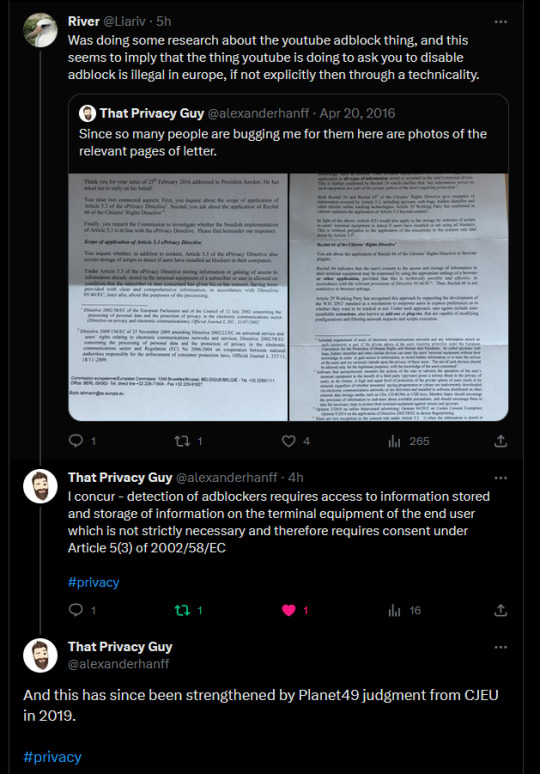
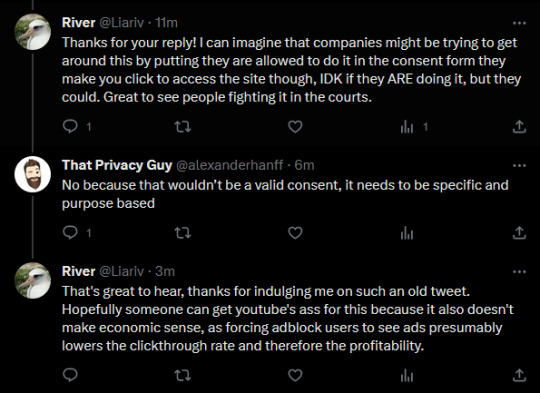
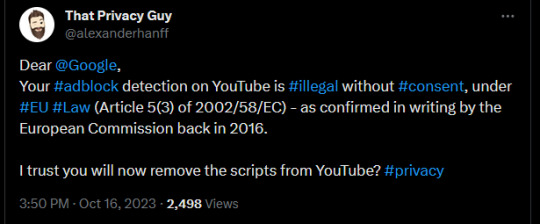
Cool interaction I just had on twitter! It's not easily enforceable, but it seems like the thing youtube are doing where they detect if you are using an adblocker is not only economically unviable, but could actually be illegal in europe under GDPR! It requires determining if you have specific software available on your computer, which legally you can't do without consent under GDPR. I really hope someone is able to fight this! I know it's a longshot but it would be super cool.
Link to Alexander Hanff's original tweet showing a legal letter from the EU that re-enforces this point: https://twitter.com/alexanderhanff/status/722861362607747072
1K notes
·
View notes
Text
was getting "error loading forms" when trying to reblog. also my custom page was not loading home, settings, etc. icons. feared it was the start of another shadowban cycle but this turned out to be tumblr wanting me to fill out a cookie consent form, the notification of which was done by a popup ublock was preventing from loading.
1 note
·
View note
Text

Shoutout to Tumblr for showing me a job ad for a company whose business model is being dismantled by the EU court of justice as we speak. Very poggers.
2 notes
·
View notes
Text
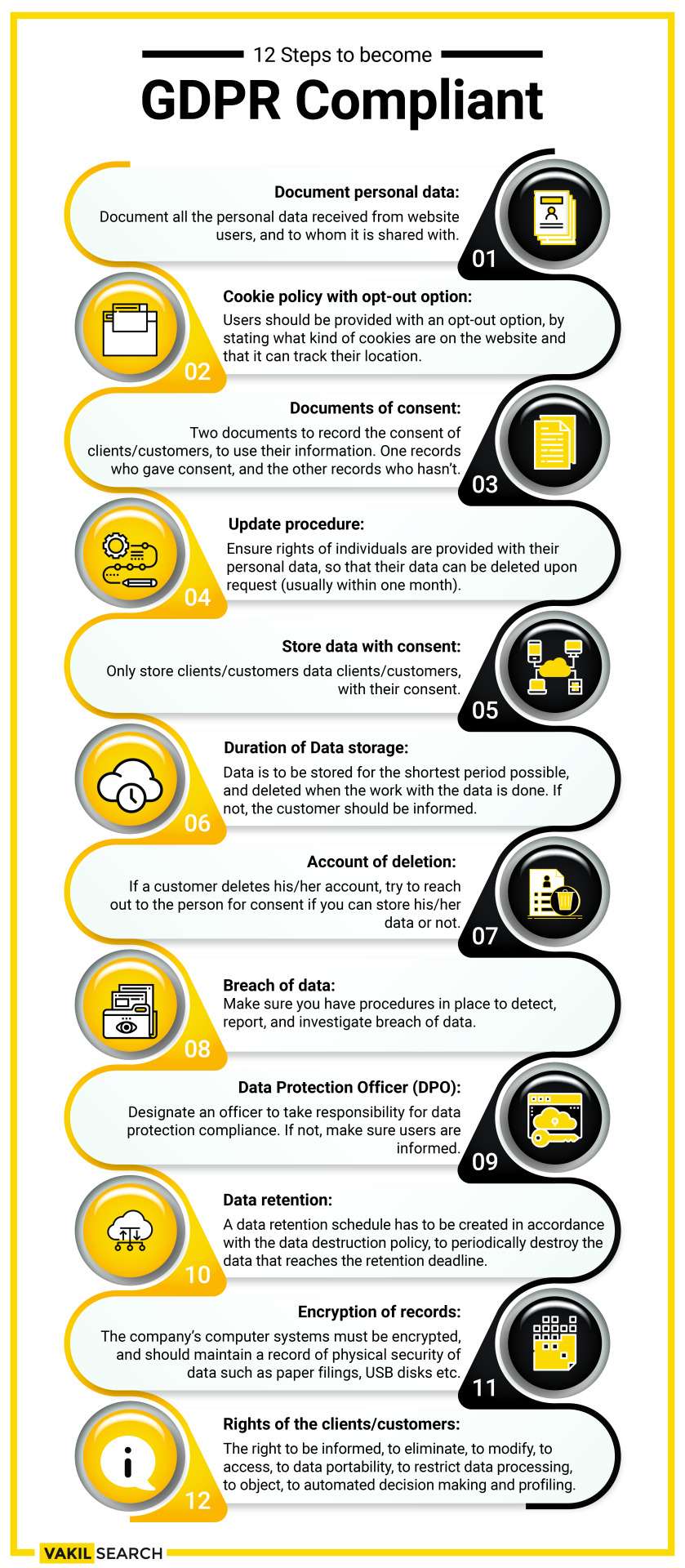
#gdpr#gdpr full form#gdpr compliance#gdpr stands for#what is gdpr#gdpr meaning#gdpr applies to#gdpr principles#gdpr india#what is gdpr compliance#data protection laws in india
2 notes
·
View notes
Text
#gdpr certification#gdpr standard#siscertifications#sis certifications#gdpr#gdpr requirements#iso certification#gdpr compliance#iso certification services
0 notes
Text
“Reject All” cookie consent update
On 9 August 2023, the UK Information Commissioner’s Office (ICO) and the UK Competition & Markets Authority (CMA) jointly published a position paper on harmful design practices in digital markets, particularly focusing on cookie consent banners. The paper clarifies the ICO’s stance on the “Reject All” button in these banners.
Key points from the paper include:
Equal Ease for Consent Choices:…

View On WordPress
#CMA regulations#consent choices#cookie banners#cookie consent#cookie policy#data protection laws#digital markets#digital platform compliance#fair consent mechanisms#GDPR compliance#harmful design practices#ICO guidance#non-essential cookies#nudge techniques#PECR compliance#Privacy and Electronic Communications Regulations#Reject All button#reject all cookies#sludge techniques#transparent consent#UK GDPR Article 4(11)#UK GDPR Article 5(1)(a)#user privacy rights
0 notes
Text







Spotting Sword and Fire # Game Develop 3D Game Figures
Now a Game Studio [ 3D ]
0 notes
Text
The GDPR aims to increase individuals’ access to personal data. This is aimed at standardizing data protection practices across the European Union or EU. The General Data Protection Regulation or GDPR was in effect in 2018. The main aim is to establish standards for businesses to adhere to.
1 note
·
View note
Text
Is Iraq GDPR Certification Required?Companies become GDPR-compliant?

GDPR Certification in Iraq for companies in view that data is indispensable to business organisation in this digital age, defending human beings's privateness and rights has developed to be an international issue. The European Union made the normal files safety legislation (GDPR) to shield the private records of European humans. It is miles a massive step inside the proper path. In spite of the reality that GDPR is a European regulation, it has consequences internationally, even in Iraq. This blog will speak about whether or not or no longer GDPR licensing is wanted in Iraq and the stairs companies can take to comply with the guidelines.
grasp GDPR Certification and how it influences the whole international.
The GDPR Certification in Iraq is supposed to provide humans electrical energy over their records and make certain that groups are accountable. It affects companies inner and backyard the European that deal with the private data of those who remain in the ecu. Due to the reality GDPR applies out of the doors of Europe, Iraqi agencies that do enterprise with eu clients or clients have to examine its policies.
Do groups in Iraq favour GDPR Certification?
As of now, Iraqi groups no longer require GDPR Certification. but, Iraqi organisations that cope with European citizens' information ought to strictly comply with the GDPR guidelines. no longer following the recommendations can cause harsh punishments, consisting of hefty fines. Adhering to GDPR guidelines is quintessential for agencies that cope with information at some point of borders, even though Certification is no longer required.
Steps to acquire GDPR Compliance in Iraq.
understand and Map facts Flows:
First, very properly take a look at all the touchy information your employer handles. find out how this file moves through your corporation and which third-party companies are worried. The foundation for constructing a sturdy GDPR compliance layout may additionally be this mapping.
You must employ a archives safety Officer (DPO):
choose a data security Officer who may want to be at the cost of making certain that GDPR guidelines are observed. This man or lady ought to recognize lots of facts about security prison recommendations and make positive the enterprise corporation follows GDPR policies.
alternate the privateness notices and policies:
test your records policies and warnings to make certain they align with GDPR regulations and make any crucial changes. make positive you are obvious collectively with your customers or customers about amassing, processing, and storing non-public records.
information protection have an impact on tests (DPIAs) have to be used:
Do DPIAs discern out what the dangers are that encompass coping with data and the way to limit them? This proactive technique permits detect manageable privateness troubles and makes it viable to take steps to restore them.
safe Processing of statistics:
protect the personal files you deal with via the use of inserting in vicinity robust protection measures. Encryption, get proper entry to limits, and frequent security exams are all a phase of this. Records security is integral beneath GDPR, and a breach will have hazardous results.
obtain Consent and grant opt-Out options:
earlier than processing a person's information, make sure you have their particular permission. Also, it makes it smooth for customers to choose no longer to take part in records coping with activities. GDPR stresses how quintessential it is a long way for permission to be freely given and chiefly primarily based on knowledge.
assist people with statistics rights:
find out about the rights of facts topics beneath GDPR, which encompass the proper to peer their records and characteristics that are corrected, deleted, or despatched to each and every different character. set up strategies to quickly react to requests from data subjects.
Get your group geared up:
educate your people about GDPR pointers and how imperative it is to shield data via training occasions. The crew of employees ought to be conscious of GDPR compliance steps for them to art work properly.
Watch and replace:
maintain an eye constant on how you are managing documents often and make changes for your GDPR compliance steps as needed. The regulatory surroundings modifications over the years; retaining up with the ones modifications is quintessential for following the guidelines.
are searching for jail steering:
rent legal professionals who understand hundreds of records about safety felony suggestions to make certain your business's insurance policies and approaches align with GDPR standards. A legal professional can come up with really helpful recommendations and ideas all through the jail method.
Why choose Factocert GDPR Certification in Iraq?
Factocert is one of the pinnacle main GDPR Certification carriers in Iraq. We grant the outstanding GDPR specialists in iraq, Baghdad, Mosul, Basra, Erbil, Najaf, Karbala, and different most important cities in Iraq.factocert is the most depended on GDPR Certification our bodies in Iraq go to our internet site www.factocert.com or contact us at [email protected] for service of implementation, training, auditing, and registration.We provide exceptional ISO necessities like ISO 27001,ISO 9001,ISO 45001 ,ISO 14001,ISO 13485,ISO 22000,and ISO 17025.
Conclusion
GDPR Certification in Iraq isn't always usually required, then again companies with european entities or different global places difficulty to GDPR ought to look at the rules. Iraqi companies can not solely get away from crook brothers by using the capability of understanding GDPR and taking the proper steps on the other hand additionally assembling faith with their companions and clients. The route to GDPR compliance is a promise to manage records responsibly, protect privacy, and certainly run a commercial enterprise inside the digital age.
For increased records go to : GDPR Certification in Iraq
Related Links :
GDP Certification in Iraq
GLP Certification in Iraq
GMP Certification in Iraq
SOC 1 Certification in Iraq
SOC 2 Certification in Iraq
SA 8000 Certification in Iraq
RoHS Certification in Iraq
HALAL Certification in Iraq
0 notes
Text
SOCIAL COMMERCE: UNVEILING THE IMPACT OF IN-APP SHOPPING ON SOCIAL MEDIA PLATFORMS
In the ever-evolving landscape of digital marketing, staying ahead of the curve is essential for businesses seeking online success. One trend that’s causing ripples in the world of e-commerce and digital marketing is the fusion of social media and online shopping, known as “Social Commerce.”
In this comprehensive blog, we’ll explore the impact of in-app shopping on social media platforms, uncovering its various facets, benefits, and implications for businesses. Welcome to the future of online success with LABHANYA TECHNOLOGIES, your ultimate partner for digital marketing that goes beyond the basics.
UNDERSTANDING SOCIAL COMMERCE
Social commerce represents the seamless integration of e-commerce and social media, allowing businesses to sell products directly within social media platforms. This phenomenon is revolutionizing the way consumers interact with brands and make purchase decisions.
The Rise of In-App Shopping
Over the past few years, in-app shopping has witnessed exponential growth. Social media platforms have evolved from mere advertising spaces to fully-fledged online marketplaces, giving users the ability to browse, discover, and purchase products without leaving their favorite apps.
THE SOCIAL COMMERCE ECOSYSTEM
Key Players in Social Commerce: To grasp the impact of social commerce, it’s crucial to identify the major players. Platforms like Instagram Shopping, Facebook Marketplace, and Pinterest Buyable Pins have become pioneers in this space, offering businesses new avenues to reach their target audiences.
Integration with Social Media Platforms
The beauty of social commerce lies in its seamless integration with popular social media channels. Users can now shop while scrolling through their feeds or engaging with content, creating a frictionless shopping experience.
BENEFITS OF SOCIAL COMMERCE
Enhanced User Experience
Social commerce enhances the overall user experience by making shopping more convenient and enjoyable. With in-app shopping, users can explore products, read reviews, and make purchases with just a few taps, eliminating the need to switch between apps or websites.
Improved Customer Engagement
Social commerce strategies foster higher levels of customer engagement. Interactive features like live shopping events, polls, and user-generated content encourage users to actively participate and build a sense of community around brands.
Boosted Conversions and Sales
Businesses embracing social commerce have reported significant increases in conversions and sales. The ability to showcase products directly within a social media environment reduces the friction associated with traditional e-commerce, leading to higher conversion rates.
Data-Driven Insights
Social commerce platforms provide a wealth of data and insights. Businesses can gain valuable information about user behavior, preferences, and purchasing habits, enabling them to refine their marketing strategies and product offerings.
SOCIAL COMMERCE IN ACTION
User-generated content plays a pivotal role in driving social commerce. Businesses can harness the power of customer reviews, photos, and testimonials to build trust and authenticity, ultimately driving sales.
CHALLENGES AND CONSIDERATIONS
Privacy and Security Concerns
As social commerce evolves, businesses must address privacy and security concerns. Safeguarding customer data and ensuring secure transactions is paramount to maintain trust.
Competition and Saturation
With the growing popularity of social commerce, competition within the space is intensifying. Businesses must develop unique strategies to stand out in a crowded market and capture their audience’s attention.
Aligning with Brand Values
While pursuing social commerce opportunities, it’s essential to ensure that these efforts align with your brand’s values and mission. Consistency in messaging and branding is key to maintaining authenticity.
STRATEGIES FOR EFFECTIVE SOCIAL COMMERCE
Creating Shoppable Content
Crafting shoppable content is an art. Businesses can learn how to curate engaging posts that lead users seamlessly from discovery to purchase, maximizing the impact of social commerce.
Leveraging Influencer Marketing
Influencers play a significant role in promoting social commerce. Collaborating with the right influencers can extend your reach and credibility, helping you tap into new audiences.
Personalization and Recommendations
Personalization is at the heart of effective social commerce. Learn how to harness data-driven personalization and recommendations to enhance the shopping experience and drive sales.
THE FUTURE OF SOCIAL COMMERCE
Augmented Reality Shopping
The future of social commerce holds exciting possibilities, including augmented reality shopping. Imagine trying on clothes virtually or visualizing furniture in your home before making a purchase.
Voice Commerce
Voice-assisted shopping is also on the horizon. With the rise of smart speakers and virtual assistants, users will soon be able to shop using their voices, further streamlining the shopping experience.
Global Expansion
Social commerce is not limited by borders. Discover how this trend is expanding globally, opening up new opportunities for businesses to reach international audiences.
HOW LABHANYA TECHNOLOGIES CAN HELP?
Tailored Social Commerce Strategies: At Labhanya Technologies, we specialize in crafting personalized social commerce strategies tailored to your unique business goals and target audience.
Data Analytics and Insights: Our data-driven approach provides you with valuable insights to optimize your social commerce efforts continually. We leverage data to refine strategies and drive results.
Maximizing Online Success: Partner with Labhanya Technologies to harness the full potential of social commerce and achieve your digital marketing objectives. We’re here to guide you every step of the way.
FINAL THOUGHTS
In conclusion, the fusion of social media and e-commerce through social commerce is reshaping the digital marketing landscape. Businesses that embrace this trend and adapt their strategies accordingly are poised for significant growth.
At Labhanya Technologies, we understand the challenges and opportunities that come with the fusion of e-commerce and social media, all while navigating complex privacy regulations.
To embark on a journey of digital marketing excellence in compliance with evolving privacy regulations, feel free to reach out to us. Whether you’re in India or anywhere around the world, you can reach us at the following numbers:
For inquiries within India, call us at +91 8368521254.
For international inquiries, dial +1 719 999 0082.
We’re committed to helping businesses thrive in the digital realm while adhering to the highest privacy standards. Feel free to contact us to explore how we can support your digital marketing journey and ensure compliance with evolving privacy regulations. Your online success awaits, and Labhanya Technologies is here to guide you every step of the way.
FOLLOW US: Labhanya Technologies pvt. ltd.
#Digital Marketing Solutions#SEO Services#Content Marketing#Social Media Optimization#PPC Advertising#Data Analytics#Mobile Marketing#Video Marketing#E-commerce Strategies#Voice Search Optimization#AI in Marketing#Chatbot Integration#Local SEO#Influencer Collaboration#Customer Retention#Blockchain in Marketing#Augmented Reality Marketing#Interactive Content#GDPR Compliance#Cybersecurity for Marketing#Customer Journey Mapping#Online Reputation Management#Email Marketing#Web Analytics#Conversion Rate Optimization
0 notes
Text
GDPR and Digital Marketing: Ensuring Compliance and Building Trust
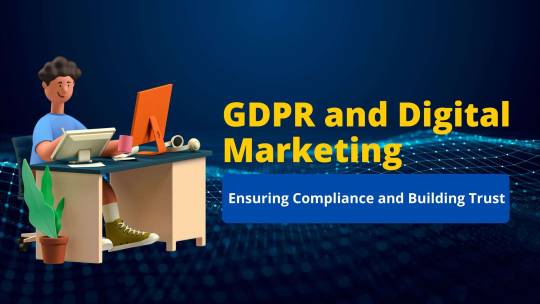
in the rapidly evolving digital landscape, the general data protection regulation (gdpr) has emerged as a landmark legislation, reshaping the way businesses handle personal data. enacted in 2018 by the european union, gdpr has not only brought about a significant shift in data protection and privacy but has also forced digital marketers to rethink their strategies. in this blog post, we will explore the fundamental principles of gdpr, its influence on digital marketing practices, steps for ensuring compliance, and how embracing gdpr can build trust and transparency with customers.
Understanding the Principles of GDPR
in an era where digital interactions have become an integral part of our daily lives, the protection of personal data has never been more critical. the general data protection regulation (gdpr), introduced by the european union in 2018, has set the stage for a new standard in data privacy and security. central to the gdpr are its fundamental principles, which serve as the guiding lights for organizations seeking to handle personal data responsibly and ethically. in this blog post, we will delve into the core principles of gdpr, unraveling the essence of each and their significance in shaping data protection practices.
transparency
at the heart of gdpr lies the principle of transparency. organizations are obligated to communicate clearly and openly with individuals about how their data is being processed. this includes providing information about the purposes of data processing, the duration of storage, and the rights individuals have over their data. transparent communication builds trust and empowers individuals to make informed decisions about the use of their personal information.
purpose limitation
gdpr emphasizes the concept of purpose limitation, ensuring that organizations collect and process personal data for specified, explicit, and legitimate purposes. data controllers must outline the purpose of data processing at the time of collection and cannot use the data for purposes incompatible with the original intent. this principle prevents the indiscriminate use of personal data, promoting responsible and targeted data processing.
data minimization
in the era of big data, the principle of data minimization encourages organizations to collect only the data that is strictly necessary for the intended purpose. unnecessary or excessive data collection is discouraged under gdpr, promoting a leaner and more focused approach to handling personal information. this not only reduces the risk of data breaches but also respects the privacy of individuals by limiting the scope of information gathered.
accuracy
maintaining the accuracy of personal data is a fundamental obligation under gdpr. organizations must take reasonable steps to ensure that the data they process is accurate and up-to-date. individuals have the right to request corrections to their data, reinforcing the importance of accuracy in fostering trust and reliability in data processing practices.
storage limitation
the principle of storage limitation dictates that personal data should not be retained longer than necessary for the purposes for which it was collected. organizations must establish clear retention periods and dispose of data when it is no longer needed. this minimizes the risk of unauthorized access, reduces storage costs, and aligns with the overarching goal of responsible data management.
integrity and confidentiality
gdpr places a strong emphasis on maintaining the integrity and confidentiality of personal data. organizations are required to implement appropriate security measures to protect against unauthorized access, disclosure, alteration, and destruction of data. this principle ensures that personal information remains secure throughout its lifecycle, safeguarding the privacy and rights of individuals.
How GDPR Affects Digital Marketing Practices
the digital marketing landscape has undergone a seismic shift with the advent of the general data protection regulation (gdpr), a regulatory framework introduced by the european union in 2018. as a cornerstone in the realm of data protection, gdpr has significantly altered the way businesses approach digital marketing. in this blog post, we will explore the profound impact of gdpr on digital marketing practices and the ensuing changes that organizations must navigate to ensure compliance and build trust with their audiences.
explicit consent requirements
one of the most noticeable shifts brought about by gdpr is the emphasis on obtaining explicit consent from individuals before collecting and processing their personal data. in the world of digital marketing, this means that businesses must be transparent about their data collection practices and explicitly ask for permission. this has led to the evolution of opt-in strategies, where marketers seek affirmative consent through clear and unambiguous language, making it imperative for brands to earn the trust of their audience right from the outset.
enhanced user rights
gdpr has bestowed individuals with greater control over their personal data. digital marketers now need to be cognizant of the expanded rights granted to users, including the right to access, rectify, and even erase their personal information. this dynamic shift underscores the need for robust data management practices, secure storage systems, and mechanisms that facilitate easy user engagement for data-related inquiries.
data portability and interoperability
another facet of gdpr affecting digital marketing is the right to data portability. individuals now have the right to request their data in a commonly used and machine-readable format, enabling them to transfer it to another service provider. this has implications for businesses, requiring them to ensure the interoperability of their systems and provide mechanisms for data portability to accommodate the changing preferences and choices of their audience.
profiling and automated decision-making
the regulation places specific emphasis on the potential risks associated with automated decision-making processes, including profiling, that significantly impact individuals. digital marketers employing such tactics must now ensure transparency in their algorithms and provide individuals with the right to object. this shift not only places a premium on ethical marketing practices but also reinforces the importance of human oversight in decision-making processes.
data security and breach notification
gdpr mandates a heightened focus on data security and prompt breach notification. digital marketers must implement robust security measures to safeguard the personal data they collect. in the event of a data breach, organizations are obligated to notify both the relevant authorities and affected individuals promptly. this increased accountability underscores the importance of investing in cybersecurity measures to protect both the data and the trust of the audience.

Steps for Ensuring Compliance with GDPR in Digital Marketing
the general data protection regulation (gdpr) has ushered in a new era of accountability and transparency for businesses engaging in digital marketing. as organizations grapple with the complexities of data protection, ensuring compliance with gdpr has become paramount. in this blog post, we will outline essential steps that digital marketers can take to navigate the regulatory landscape and align their practices with gdpr requirements.
conduct a comprehensive data audit
the first crucial step in achieving gdpr compliance is to conduct a thorough data audit. understand what personal data your organization is collecting, where it is stored, how it is processed, and who has access to it. this audit serves as the foundation for crafting policies and procedures that align with gdpr principles.
update privacy policies and notices
review and update your organization’s privacy policies and notices to ensure they align with the transparency requirements of gdpr. clearly communicate to users the purposes for which their data is collected, how it will be processed, and their rights regarding their personal information. make sure that the language used is clear, concise, and easily understandable.
implement robust consent mechanisms
under gdpr, explicit and informed consent is crucial for processing personal data. update your consent mechanisms to ensure that users are fully aware of what they are agreeing to when providing their information. this may involve revisiting opt-in forms, making consent checkboxes more explicit, and providing clear information about the specific purposes for which the data will be used.
establish data processing agreements
if your organization shares personal data with third-party processors, it is imperative to establish data processing agreements (dpas) with them. these agreements outline the responsibilities of each party and ensure that all entities involved in data processing adhere to gdpr standards. conduct due diligence on your data processors to confirm their own gdpr compliance.
train your team on gdpr compliance
educate and train your team members, especially those involved in data processing and marketing activities, on the principles and requirements of gdpr. this includes understanding the importance of data protection, recognizing potential risks, and being vigilant about compliance in day-to-day operations. regular training sessions can help instill a culture of data privacy within the organization.
implement security measures
gdpr places a strong emphasis on the security of personal data. implement robust security measures to protect against unauthorized access, data breaches, and other security incidents. this may involve encryption, access controls, and regular security assessments to identify and mitigate potential vulnerabilities.
establish a data breach response plan
despite best efforts, data breaches can still occur. develop a comprehensive data breach response plan that outlines the steps to be taken in the event of a security incident. this includes notifying the relevant authorities and affected individuals within the specified timeframe mandated by gdpr.
regularly assess and update compliance
gdpr compliance is an ongoing process that requires regular assessments and updates. conduct periodic reviews of your data processing activities, privacy policies, and security measures to ensure continued compliance with evolving regulations. stay informed about changes to gdpr and adjust your practices accordingly.
Building Trust and Transparency with Customers through GDPR Compliance
in the era of data-driven digital marketing, trust and transparency have become indispensable currencies. the general data protection regulation (gdpr) stands as a beacon, guiding businesses toward a future where customer trust is earned through responsible data handling practices. in this blog post, we will explore the pivotal role of gdpr compliance in building trust and transparency with customers and how organizations can turn regulatory requirements into opportunities to strengthen relationships with their audience.
clear communication on data handling practices
transparency begins with clear communication. gdpr mandates that businesses communicate openly with customers about how their data is collected, processed, and utilized. by providing clear and easily understandable information about data handling practices, organizations foster an environment of trust. this transparency not only ensures compliance with gdpr but also empowers customers to make informed decisions about sharing their personal information.
explicit consent mechanisms
one of the fundamental principles of gdpr is obtaining explicit and informed consent from individuals before collecting their data. building trust requires going beyond mere compliance and making consent mechanisms a positive and user-friendly experience. clearly explain why you need the data, how it will be used, and give users the control to opt in or opt out. this not only respects users’ privacy rights but also contributes to a positive customer experience.
empowering users with data rights
gdpr grants individuals enhanced rights over their personal data. embrace these rights as an opportunity to empower your customers. provide easy-to-use mechanisms for users to access, rectify, or delete their data. by demonstrating a commitment to respecting user rights, businesses can build trust and credibility, showcasing their dedication to ethical data practices.
data breach response transparency
in the unfortunate event of a data breach, transparency in communication is key. gdpr mandates timely and transparent communication with both regulatory authorities and affected individuals. being proactive in acknowledging and addressing a data breach demonstrates accountability and a commitment to resolving issues swiftly, which can help mitigate potential damage to customer trust.
privacy by design and default
integrate privacy into your products and services from the outset by adopting a “privacy by design and default” approach, as recommended by gdpr. this means considering data protection at every stage of development, minimizing data collection, and ensuring that privacy settings are set to the most secure options by default. such practices not only align with gdpr but also signal a dedication to customer privacy and trust.
regularly update privacy policies
privacy policies should be dynamic documents that evolve with the changing data landscape and regulatory requirements. regularly update your privacy policies to reflect any changes in data processing practices, security measures, or compliance standards. clearly communicate these updates to your customers, reinforcing your commitment to transparency and keeping them informed about how their data is handled.
educational initiatives for customers
an informed customer is an empowered one. consider launching educational initiatives that inform your customers about data protection, privacy rights, and the steps your organization takes to ensure gdpr compliance. by proactively educating your audience, you not only enhance their understanding but also position your brand as a trustworthy steward of their data.
Case Studies of Companies Successfully Implementing GDPR in Their Digital Marketing Strategies
as the digital landscape continues to evolve, businesses face the challenge of aligning their marketing strategies with the ever-changing regulatory environment. the general data protection regulation (gdpr) has emerged as a pivotal framework, reshaping the way companies approach data privacy. in this blog post, we will delve into case studies of companies that have successfully navigated the complexities of gdpr compliance, showcasing best practices and lessons learned in integrating data protection into their digital marketing strategies.
apple inc.: prioritizing user privacy and consent
apple has long been a proponent of user privacy, and gdpr presented an opportunity to reinforce this commitment. apple’s transparent approach to data collection and processing is reflected in its user-friendly privacy features, such as app tracking transparency (att). by giving users control over whether apps can track their data for advertising purposes, apple not only complies with gdpr but also builds trust with its user base.
hubspot: building a gdpr-compliant marketing hub
hubspot, a leader in inbound marketing, took a proactive approach to gdpr compliance by implementing robust tools and features within its marketing hub. hubspot enables users to manage consent, update preferences, and easily unsubscribe from communications. the platform’s commitment to user control aligns with gdpr principles, allowing businesses to execute effective digital marketing campaigns while respecting individual privacy rights.
ibm: embracing gdpr as a global standard
ibm, a multinational technology and consulting company, embraced gdpr not only as a regulatory necessity but as a global standard for data protection. by implementing comprehensive data governance practices, conducting regular audits, and investing in advanced cybersecurity measures, ibm positioned itself as a leader in gdpr compliance. the company’s commitment to protecting customer data has enhanced its reputation and built trust among clients worldwide.
dropbox: streamlining data processing with gdpr
cloud storage provider dropbox embraced gdpr as an opportunity to streamline its data processing practices. the company revised its privacy policy, simplified its terms of service, and introduced user-friendly tools for data management. by enhancing transparency and making it easier for users to understand and control their data, dropbox not only achieved compliance but also improved the overall user experience.
trustarc: navigating gdpr compliance for clients
trustarc, a privacy compliance management company, provides a case study in helping businesses navigate gdpr compliance successfully. by leveraging its expertise, trustarc assists clients in implementing gdpr-compliant practices, including consent management, data mapping, and risk assessments. through tailored solutions and continuous support, trustarc empowers businesses to embrace gdpr without compromising their digital marketing goals.
wix: empowering users with data control
website development platform wix prioritized user empowerment in its gdpr compliance strategy. wix introduced features that allow users to manage their privacy settings, control the information they share, and customize cookie preferences. by putting control in the hands of users, wix not only complies with gdpr requirements but also enhances user trust and loyalty.
Tools and Resources for Staying Updated and Compliant with GDPR Regulations
in the ever-evolving landscape of data protection, staying updated and compliant with the general data protection regulation (gdpr) is crucial for businesses operating in the digital realm. to assist organizations in navigating the complexities of gdpr, a range of tools and resources have emerged. in this blog post, we’ll explore some essential tools and resources that empower businesses to stay informed, adapt to regulatory changes, and ensure ongoing compliance with gdpr regulations.
trustarc: comprehensive privacy management platform
trustarc offers a comprehensive privacy management platform designed to simplify gdpr compliance. the platform provides tools for consent management, data mapping, risk assessments, and ongoing monitoring. trustarc helps businesses assess their current compliance status, implement necessary changes, and stay abreast of evolving privacy regulations.
onetrust: all-in-one privacy management solution
onetrust is a leading provider of privacy management solutions, offering a comprehensive platform to assist businesses in gdpr compliance. the tool includes features such as consent management, data subject request management, and automated assessments. onetrust’s modular design allows organizations to tailor the platform to their specific needs, ensuring a robust and scalable solution.
gdpr awareness coalition: educational resources
the gdpr awareness coalition is a non-profit organization that aims to provide educational resources to help individuals and organizations understand gdpr. their website offers a wealth of articles, guides, and webinars covering various aspects of gdpr compliance. it serves as a valuable resource for staying informed about regulatory updates and best practices.
european data protection board (edpb): official guidance
the edpb is an independent european body that contributes to the consistent application of data protection rules throughout the european union. their official website provides a wealth of guidance, faqs, and opinions on various gdpr-related topics. monitoring the edpb’s publications is essential for staying updated on regulatory interpretations and recommendations.
gdpr.eu: practical guides and templates
gdpr.eu is a dedicated resource hub offering practical guides, templates, and insights to assist businesses in achieving gdpr compliance. the platform covers a range of topics, including data mapping, risk assessments, and documentation templates. the straightforward and practical nature of the resources makes gdpr.eu a valuable tool for organizations of all sizes.
data protection authorities (dpas): local guidance
each eu member state has its own data protection authority responsible for enforcing gdpr within its jurisdiction. monitoring the guidance and publications of the relevant dpa is crucial for understanding local interpretations and enforcement priorities. organizations should regularly check the websites of the dpas in countries where they operate for the latest information.
gdpr tracker: regulatory changes monitoring
gdpr tracker is a tool that monitors and tracks regulatory changes related to gdpr. it provides real-time updates on amendments, court decisions, and regulatory developments. staying informed about changes to the legal landscape is essential for adapting compliance strategies promptly.
gdpr alliance: collaborative learning and updates
gdpr alliance is an online platform that promotes collaborative learning and knowledge sharing on gdpr compliance. it features forums, webinars, and resources contributed by industry experts and practitioners. engaging with the gdpr alliance community provides valuable insights and practical tips for addressing common challenges.
Future Predictions and Potential Changes with Regards to GDPR in Digital Marketing
as the digital landscape continues to evolve, so too does the regulatory environment surrounding data protection. the general data protection regulation (gdpr), enacted in 2018, has already made a significant impact on how businesses handle personal data. looking ahead, it is essential to anticipate future developments and potential changes that may shape the intersection of gdpr and digital marketing. in this blog post, we will explore future predictions, emerging trends, and potential changes that organizations should be mindful of as they navigate the evolving landscape of gdpr in digital marketing.
stricter enforcement and fines
one prediction for the future is an increased emphasis on stricter enforcement of gdpr regulations and potentially higher fines for non-compliance. as regulatory authorities gain more experience in implementing and enforcing gdpr, we can anticipate a more robust stance on ensuring organizations adhere to the principles outlined in the regulation. this could lead to larger fines for serious violations, further incentivizing businesses to prioritize compliance.
global adoption of gdpr-like regulations
while gdpr is a european regulation, its influence has reverberated globally, inspiring other regions to adopt similar data protection frameworks. as awareness of privacy rights grows, we may see more countries and regions implementing gdpr-like regulations to enhance the protection of individuals’ personal data. businesses operating globally should prepare for potential variations in compliance requirements across different jurisdictions.
evolution of consent management practices
the evolution of consent management practices is likely to continue as organizations seek more user-friendly and transparent ways to obtain and manage user consent. future developments may include standardized consent mechanisms, enhanced user interfaces, and innovative technologies to streamline the consent process. businesses should stay agile in adapting their consent management strategies to align with emerging best practices.
technological solutions for automated compliance
as the volume of digital data continues to grow, there is a growing need for technological solutions that facilitate automated compliance with gdpr. artificial intelligence (ai) and machine learning (ml) technologies may play a significant role in automating aspects of data protection, such as data mapping, risk assessments, and ongoing compliance monitoring. businesses should explore and invest in technologies that offer efficient and scalable solutions for gdpr compliance.
greater emphasis on ethical data practices
consumer awareness about data privacy and ethical considerations is on the rise. organizations are likely to face increasing pressure to adopt and communicate ethical data practices beyond mere compliance. future marketing strategies may need to emphasize not only legal compliance but also a commitment to ethical data handling, fostering a positive brand image and stronger relationships with customers.
enhanced rights for data subjects
as discussions around data privacy intensify, there may be calls for enhancing the rights of data subjects under gdpr. future amendments or regulations could expand the rights of individuals, potentially giving them more control over how their data is used, processed, and shared. businesses should stay attuned to these potential changes and be prepared to adapt their practices accordingly.
collaboration between regulators and industry
to address the challenges of a rapidly evolving digital landscape, future collaborations between regulators and industry stakeholders are anticipated. this collaboration may involve the development of industry-specific guidelines, best practices, and standards to facilitate compliance. businesses should actively engage in industry dialogues and stay informed about collaborative initiatives that may impact their compliance strategies.
Conclusion: The Importance of Embracing GDPR for Both
in conclusion, gdpr has ushered in a new era of responsibility and accountability in the digital marketing realm. while initially perceived as a challenge, gdpr compliance has the potential to reshape digital marketing practices for the better, fostering trust, transparency, and ethical data handling. as businesses navigate the complexities of the digital landscape, embracing gdpr is not just a legal requirement; it’s a strategic imperative for building lasting relationships with customers and ensuring the longevity of digital marketing efforts in a privacy-conscious world.

0 notes
Text
9 Steps to Become GDPR-Compliant
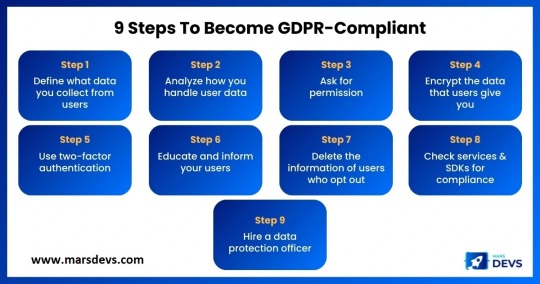
So far, we've looked at how GDPR will affect your development workflow regarding business operations and project planning. Now, let's look at how it will affect how you code. In this infographic MarsDevs explain 9 Steps to Become GDPR-Compliant.
Click here to know more: https://www.marsdevs.com/blogs/gdpr-and-its-implications-for-web-and-app-development
0 notes
Text
Data Privacy Investigations against ChtGPT
#ChatGPT faces investigation in Italy for potential #DataPrivacy breaches:
#openAI #italy #investigation #eu #data #technology #news
#artificial intelligence#inteligência artificial#technology#artificial#italy#data#privacy#gdpr compliance#gdpr
0 notes